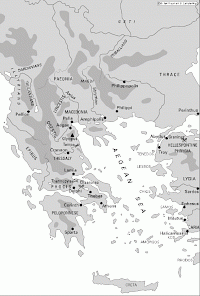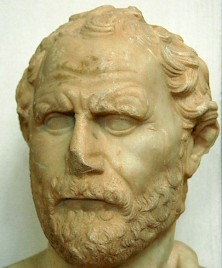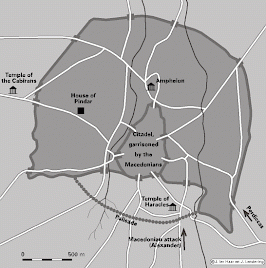Alexander 2.2
Alexander the Great (*356; r. 336-323): the Macedonian king who defeated his Persian colleague Darius III Codomannus and conquered the Achaemenid Empire. During his campaigns, Alexander visited a.o. Egypt, Babylonia, Persis, Media, Bactria, the Punjab, and the valley of the Indus. In the second half of his reign, he had to find a way to rule his newly conquered countries. Therefore, he made Babylon his capital and introduced the oriental court ceremonial, which caused great tensions with his Macedonian and Greek officers.
Restoring order in Greece
The first weeks

Alexander's first task was to get recognition as his father's true successor. An officer named Antipater arranged that the army greeted Alexander as king. Two people were executed as scapegoats: Alexander had to punish them if he wanted to prevent that people would blame him for the death of Philip. In the following year, Alexander rewarded Antipater: he became commander of the Macedonian forces in Europe, second only to the king.
At this stage, it was also important to secure the help of Parmenion, who was related to Alexander's enemy Attalus, still commanded the expeditionary forces in Asia and could turn into a dangerous enemy. Eventually, he proved loyal to the new king and killed his relative, but it is remarkable that in the next years, we find many relatives of Parmenion in key positions
- his brother Asander,
- his son Philotas as commander of the Companion cavalry,
- his son Nicanor as commander of the Shield Bearers,
- another Nicanor as admiral,
- his son-in-law Coenus as commander of a phalanx battalion,
- his friend Amyntas.
It is likely that Alexander was had been forced to make some concessions, but it served to stabilize his reign.
In the last weeks of 336, the new king called the Thessalians, who had tried to revolt, to order and organized a second conference at Corinth where he received assurances from all Greek cities (except Sparta) that they would obey the treaty with Macedonia as if it had been concluded with Alexander.
The sack of Thebes

In the spring of 335, Alexander attacked theThracian tribes living in the north and the Illyrians to the northwest of Macedonia. If he wanted to go to Asia, he had to show these people that even though the strong king Philip had been replaced by a young Alexander, the kingdom was still strong. Although Alexander's army - 15,000 men - met fierce resistance, it was a very swift war. He reached the Triballian kingdom in northern Bulgaria, crossed the Danube, defeated his enemies, continued to what is now Albania and defeated his enemies again.
Meanwhile, in the Greek cities, many politicians considered this the right moment to throw off the Macedonian yoke. An Athenian orator, Demosthenes, told the Greeks that Alexander had died during the Illyrian campaign, and provoked a rebellion in Greece. The Thebans started to besiege the Macedonian garrison that Philip had stationed in their city.

Almost immediately, Alexander went to the south. After a short siege, Thebes was stormed by the phalanx battalion of Perdiccas (text). The town was razed to the ground, except for its temples and the house that had once belonged to the poet Pindar, who had once written an ode on an earlier Macedonian king named Alexander. Six thousand inhabitants were executed and thirty thousand were sold as slaves. However, the other Greek cities were treated kindly. The Corinthian League gathered for the third time and ratified Alexander's acts against Thebes.
Our sources agree that Alexander had a meeting with the philosopher Diogenes of Sinope in a suburb of Corinth (text). Diogenes taught that people should behave as simple as possible, almost like animals, because civilization brought complications and unhappiness. When the king asked the professional pauper if there was something he could do for him, Diogenes asked Alexander to stand from between him and the sun. Later generations were fascinated by the contrast between the man whose only ambition was to live as simple as possible, and the man whose ambition was to rule the world, and the anecdote is one of the most famous ancient stories.
After this meeting, Alexander could finally concentrate on his campaign against Persia.